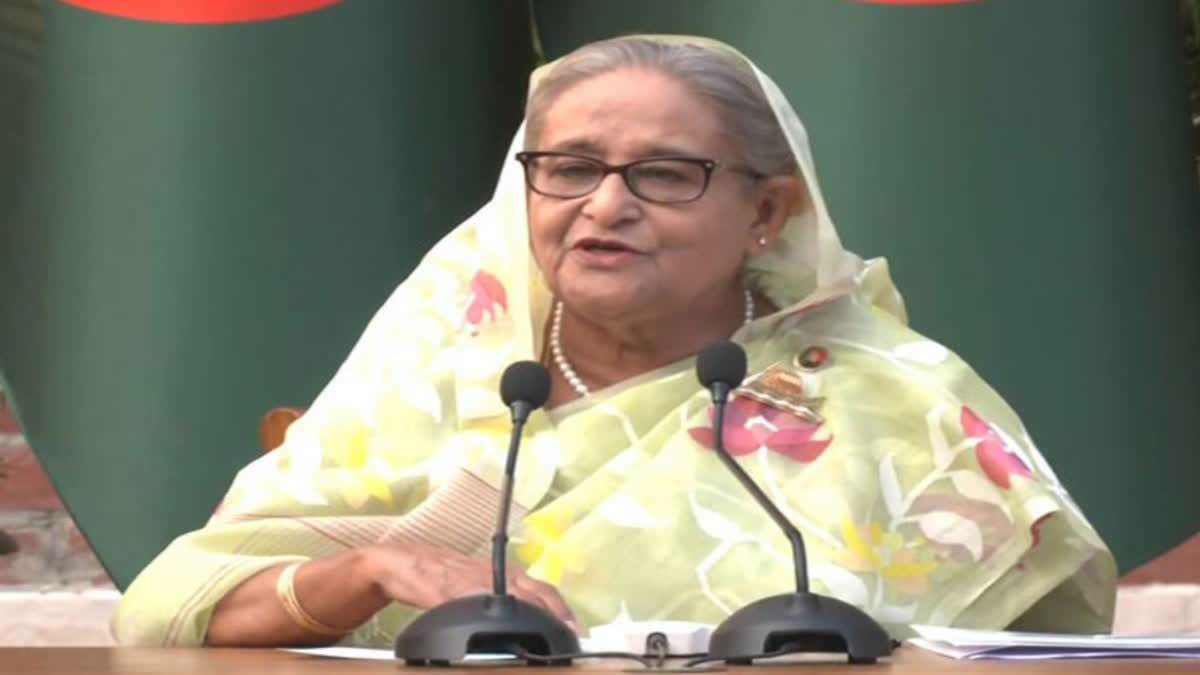New Delhi: Prime Minister Sheikh Hasina is all set to begin her India visit on Friday. She will be arriving in New Delhi on Saturday and later would be attending PM Modi's swearing-in ceremony.
Among many leaders, Hasina was the first to have received an invitation from PM Modi to participate in the swearing-in ceremony. This would be her first official trip to India following her victory in the national elections in January this year.
Modi is likely to take oath on June 8 at 8 pm as the BJP-led NDA alliance has won 293 seats in the Lok Sabha Elections.
He received a congratulatory telephone call from Hasina for NDA's victory in the 18th Lok Sabha elections on Wednesday. Hasina was among the first foreign leaders to congratulate Modi, reflecting the warmth and personal rapport between the two leaders.
The two leaders pledged to continue working together to further deepen the historic and close ties under the renewed mandate towards achieving the vision of Viksit Bharat 2047 and Smart Bangladesh 2041.
They acknowledged the significant improvements achieved in the lives of the people of both countries in the last decade and are looking forward to further enhance the transformative relationship across all domains that include economic and development partnership, energy security, connectivity including digital linkages and people-to-people contacts among others.
Modi also called Sri Lankan Prez Ranil Wickremsinghe and invited him for the ceremony, which the latter accepted.
Why is Sheikh Hasina's visit important?
Hasina's visit to India assumes significance in the light of China's growing assertiveness and her visit would be an opportunity for both the leaders to strengthen the ties. Infact, Hasina is expected to travel to China in July.
According to sources, Bangladesh is currently reeling under inflation. Bangladesh PM Hasina is expected to discuss trade, import and export of commodities during her bilateral talks with PM Modi. Any disruption in some of the essential items, which are imported by Bangladesh to India , could worsen the inflation of the neighbouring country.
The top-most priority of her visit would be the discussion on Teesta river water sharing, which is often opposed by West Bengal CM Mamata Banerjee. Banerjee has done really well this general election with her party Trinamool Congress winning 29 seats.
Notably, Banerjee criticised Modi after the outcome of the elections urging him to resign after the latter failed to gain majority in the Lok Sabha elections. She has extended all her support to India bloc, which makes the Teesta river water issue even more complicated. Even the possible reconciliation between New Delhi and Kolkata on the sharing of the river water seems difficult now.
Infact, amid the ongoing bilateral dialogue between India and Bangladesh over Teesta, New Delhi had concerns as China has been eyeing on Teesta river development projects with an estimated cost of $1 billion, for the past few years which complicates the India-Bangladesh dispute over Teesta.
The Teesta river management and restoration project aims to manage the river basin effectively, reduce floods, and address Bangladesh's summertime water shortage.
China is putting pressure on Bangladesh to come to a decision on whether to rely on India to resolve the Teesta water crisis or to go with China's proposal. This has raised concerns for India. The matter was also discussed during Foreign Secretary Vinay Kwatra's visit to Dhaka in May this year.
It is pertinent to note that the issue between India and Bangladesh over the Teesta water sharing revolves around the equitable distribution of the river water. The Teesta River is a major transboundary river that flows through the Indian states of Sikkim and West Bengal before entering Bangladesh, where it meets the Brahmaputra River.
Bangladesh seeks a greater share of the Teesta waters to support its agricultural needs, especially during the dry season. India, particularly the state of West Bengal, also relies heavily on the river for irrigation and drinking water, leading to a conflict over allocation.
A draft agreement was formulated in 2011, proposing to allocate 42.5 percent of the Teesta waters to India and 37.5 percent to Bangladesh during the dry season. However, this agreement has not been finalised due to opposition from the West Bengal government, which argues that it would adversely affect the state's water needs.
The issue is complicated by regional political dynamics within India. The West Bengal government, which is critical in this matter, has not agreed to the terms proposed by the central government, highlighting internal political challenges.
The Teesta water-sharing issue is a significant point in India-Bangladesh relations. Resolving it amicably is crucial for maintaining good bilateral ties, which also encompass broader cooperation in trade, security, and regional stability.
Read more
Way Forward for Further Consolidation of India-Bangladesh Ties



